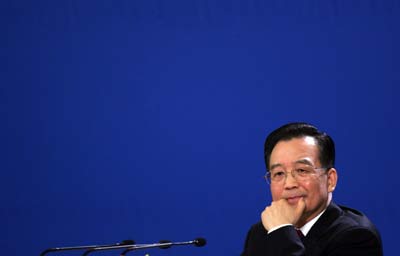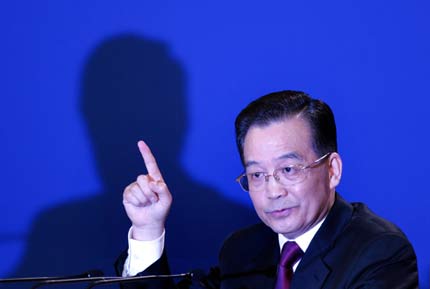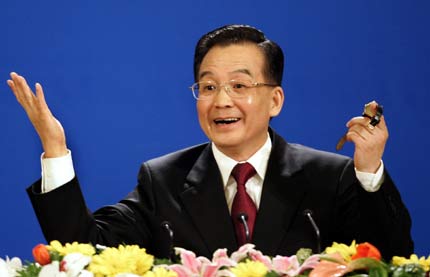Chinese premier Wen Jiabao pledged that China will continue to implement its
reform and opening-up policy, and endeavor to build the country into a well-off
state with its own characteristics.
At a press conference in the Great Hall of the People after
the lawmakers' annual session, Wen Jiabao gave a stern warning to Chen Shui-bian concerning
the Taiwan leader's secessionist activities. Wen says Beijing is paying
close attention to the situation in the island and is prepared to take action if
necessary.
Chen's recent move to scrap the reunification council and reunification
guidelines was "dangerous and deceitful", against the will of people, and
endangered peace and stability in the area, said the Chinese premier.

Chinese Premier Wen Jiabao
listens to a question during a news conference after the closing session
of National People's Congress at the Great Hall of the People in China's
capital Beijing March 14, 2006. Wen pledged on Tuesday to press that China
will continue to implement its reform and opening-up policy, and endeavor
to build the country into a well-off state with its own characteristics.
[Reuters] |
¡°China has no way out by retreating (from reform), but to go forward¡± in
facing different and amounting difficulties or setbacks, Wen said, before he fed
questions from foreign and Chinese journalists at the Great Hall of the People
in Beijing Tuesday morning.
The annual 10-day session of the
lawmaking body, the National People's Congress, concluded in Beijing Tuesday,
with the legislators approving the Eleventh Five-Year development plan for China
from 2006-2010 by an overwhelming majority. The plan highlights a government
investment shift from better developed urban areas to poorer rural regions in
the coming years.
The Chinese premier said it is a tradition that the
country and its people, while staying in stable social environment and on its
ascent, are good at thinking of the uncertainties, potential risks and
hidden problems.
Wen said that he and his administration are thankful of the people's popular
support, and what "saddened him most" in the past three years as China's premier
is that the government could have done better to solve some of people's
concerns, especially about medical care, education, housing and work safety.
** Chen Shui-bian¡®dangerous and deceitful¡¯
Wen Jiabao gave a stern warning to Chen Shui-bian concerning the Taiwan
leader's secessionist activities. Wen says Beijing is paying close attention to
the situation in the island and is prepared to take action if necessary.

Chinese Premier Wen Jiabao
answers a question during a press conference after the
conclusion of the annual session of the National People's Congress in
Beijing, March 14, 2006. The annual meeting of the nation's top lawmaking
body closed Tuesday at the Great Hall of the People.
[Xinhua] |
Wen said if Chen were to give up his pursuit for Taiwan independence, Beijing
would be ready to engage in political talk with any party, including
Taiwan's ruling Democratic Progress Party.
"The negotiations will be held on an equal footing, and there is no question
as one side will swallow up the other one," Wen said.
"No matter what
party affiliations they may have, no matter who they are, what they said or did
in the past, so long as they are committed to the one-China principle, we are
ready to have dialogues and negotiations with them, even including
those from the Democratic Progressive Party in Taiwan," Wen said.
Chen scrapped a policy-making council on reunification with the mainland
in late February.
Wen said Chen's move to scrap the reunification council and reunification
guidelines was "dangerous and deceitful", against the will of people, and
endangered peace and stability in the area. Wen said Chen, in the end, will lose
popular support from his constituency because of his secessionist activities.
"It's a grave affront to the one-China policy," Wen said.
He said the Taiwanese leader is making trouble that is affecting both the
island and the cross-Strait ties. Wen believes Chen is trying to restrict and
block cross-Strait exchanges, which may harm Taiwan's interests.
Wen said China will never tolerate the secession of Taiwan from the
motherland, and will do its best to seek for peaceful
reunification.
** New Countryside
Wen stressed the importance of building new socialist countryside in the
coming years to sustain a rapid economic growth in the future.

Chinese Premier Wen Jiabao
holds his watch as he extends his news conference for two more questions
after the National People's Congress at the Great Hall of the People in
China's capital Beijing March 14, 2006. The annual meeting of the
nation's top lawmaking body closed Tuesday at the Great Hall of the
People. [Reuters] |
"The issues concerning agriculture, rural areas and farmers are fundamental
ones bearing on the overall China's modernization drive," Wen said. Building the
new socialist countryside refers to putting agriculture and rural areas "more
prominently on the agenda of China's modernization drive."
Apart from completely rescinding agricultural taxes, China plans to earmark
nearly 340 billion yuan (US$43 billion) for agriculture, rural areas and
farmers in 2006, 42.2 billion yuan more over last year, according to Wen's work
report at this year's NPC session.
In building new socialist countryside, democratic rights of farmers should be
safeguarded, especially their rights on land production and management, Wen
said.
China's governemnt must render harsh punishment to those who illicitly
seize land from the farmers, Wen said.
** Japanese leaders
responsible for stalled bilateral ties
In response to a question on China-Japan relations, the premier admitted that
bilateral ties between the two countries has been running up with
difficulties.
It will be very difficult for the Sino-Japanese relations
to make progress if the issue of Japanese leaders' visits to a shrine
worshipping war criminals can not be well resolved, Wen said.
It is
not the Chinese nor the Japanese people, but the leaders of Japan, to blame for
the souring Sino-Japanese ties, Wen said at the press conference.
The premier stressed that the China-Japan relations could "hardly develop in
a smooth manner" unless the issue of Japanese leaders' visits to Yasukuni
Shrine worshipping class-A WWII war criminals can be well addressed.
It
is China's unswerving effort to develop friendly Sino-Japanese relations from
generation to generation, Wen said.

